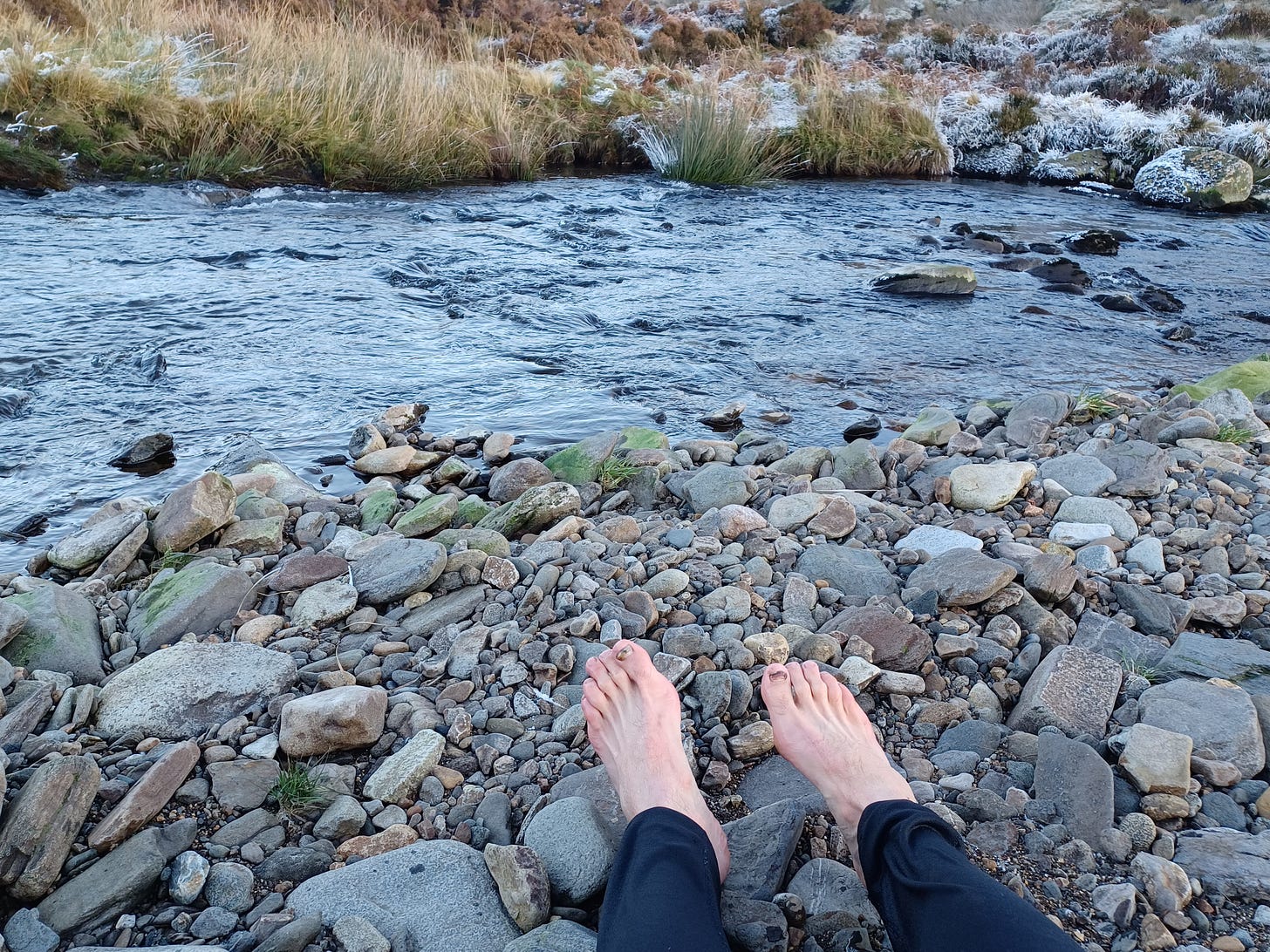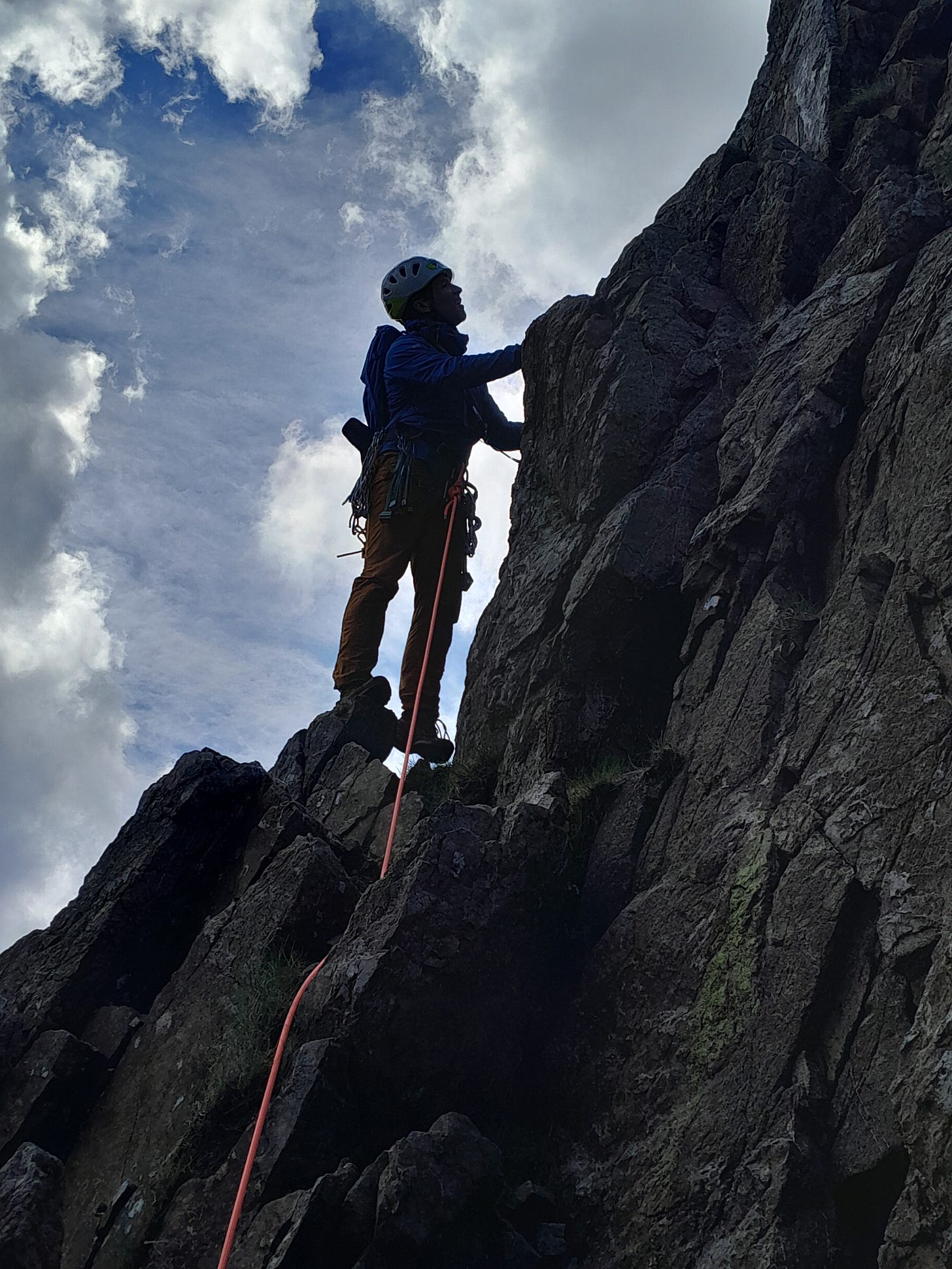I am going to start with a few unconnected stories and lead up to how the concept of the ‘mental shield’ can help you in ultra-distance running. I thought I’d flag this early, just in case when we get to the bit about the vasectomy, you start to wonder where it’s all going.
The first time I heard the term was from a climbing friend. I used to do more climbing than running and gradually converted, but still climb occasionally. My friend and I would like to do the Cuillin Ridge traverse on the Isle of Skye. Scrambling over very exposed terrain calls for a cool head, and much of the ridge needs to be done without a rope unless you want it to take ages.
The ‘mental shield’ in this case, is the strength of your belief you’re not going to fall off and die. Most of the scrambling is easy, and it is virtually certain that neither of us will fall and need the rope to save us. But the certainty of that starts to waver when the rope isn’t there. When you start to feel nervous, as well as overthinking and catastrophizing about everything, some really unhelpful physiological factors kick in - sweaty palms being the most obvious. The mental shield can stave this off, and thus keep you safe.
Next mini-story: vasectomy. I went for this a couple of years ago, and the doctor had some very interesting chat about “pain gates”, a subject on which we had written a thesis. I am pretty sure part of his vasectomy technique is to keep the patient talking and not thinking too much about what is going on with the sharp objects.
He observed that I didn’t seem too uncomfortable (this is relative), and asked whether I was feeling any pain. I said not really; it was comparable to giving blood. He then went into the subject of pain gates. Apparently, our feeling of physical pain is influenced by our expectation of how much pain we will feel. He asked me how I had felt before the operation had started.
“I was fairly relaxed,” I said. “It’s a common procedure, and you said you’d been doing it for 10 years.” He had - again, I’m sure it’s all part of the procedure to put people at ease.
He told me this was partly why it didn’t hurt. My brain had put up an actual barrier in the nervous system against pain. On the other hand, he said when men, typically sent unwillingly by their wives, were squeamish and expecting pain, pain is in fact what they felt.
I confirmed that I had 100% been sent by my wife, but took the point.

Finally, a running example. An inspiring talk by a very accomplished runner explained that the day after a huge race, you probably won’t be able to walk comfortably. But during the race, you will keep going. Physically, it seems there is a huge drop in how you feel shortly after you cross the finish line. It can’t be literally that the finish line coincidentally represents the furthest you could have run. Rather, the mind was holding things together and overriding physical feelings while fatigue built up, and then released its hold once the finish line was reached.
So, I think the mental shield is a real thing. It can protect you from unexpected developments (the running equivalent of expecting to fall off and die while climbing), and might actually reduce the physical pain you feel, or at least how you respond to it. Chances are, it will get tested when out for a big adventure.
Master the endurance mindset: Thinking, Fast and Slow
Can we train it? I think so. Two relevant key skills for the ultrarunner are expectation management and adaptability. Basically, you need to have appropriate respect for the challenge while not dreading it (expectation management), and also have some tricks up your sleeve for when it doesn’t go entirely to plan (adaptability).
A simple example of expectation management: if you’re doing a mountain race and have only trained on the flat, you’re in for a shock. Even when appropriately trained, have you correctly anticipated that you will feel tired and grotty, so it isn’t a surprise when you do? I don’t subscribe to the glorification of ‘entering the pain cave’, but there is definitely something about anticipating difficulties rather than being caught out by them.
Learn about yourself and about the challenge you’re taking on, and it will be easier to predict and deal with how you feel. As you take on and overcome more tough adventures, your belief you can do it will increase, and the dread, which can make physical discomfort worse, will reduce.
On adaptability, how well do you adjust your plans if you’re feeling worse than expected, or take a wrong turn? Do you pause, rethink and come up with a plan, or does your mental shield fracture and let the dark thoughts in?
You can practice this during training. There will always be setbacks - changing plans due to terrible weather, needing to take the car to the garage, or the kids being poorly. Do these setbacks make you grumpy? If so, see them as chances to build your mental shield. Stuff happens: work around it. Flex your training plan, do the long run another day, or do a strength session instead. Whatever - get used to adapting, and you’ll be better at it when it really counts.
It’s another skill that can be trained - and giving it a bit of attention will probably make you both stronger and happier. Everyone expects to train their body for running, but do you train your mind?
Richard Kendall is a father of two, a keen and highly accomplished ultra-distance mountain runner and coach. He is based in the Peak District. In his spare time he is a civil servant. targetultra.com
Read more from Richard:
Running vs family - the balancing act
What is a healthy amount of competition in your ultra runner’s mindset?








An interesting and informative read. I fully endorse building your 'mental shield'. Several years ago my husband required a hernia operation. He insisted he did not want a general anaesthetic and was happy to go ahead without. We discussed his choice, following a conversation with the surgeon. My husband decided he would rather put up with some pain rather than be anaesthetised. During the procedure, he had chatted with the surgeon, discovering several topics that were of interest to them both. My husband had taken a view, prior to the operation, to see it as an 'experience' not as some awful thing to 'overcome'. Adaptation to circumstances, both expected and unexpected, is an excellent tool in our mental armoury.
Really like the idea of building a mental shield. If you train your body for events why wouldn't you train your mind as well?